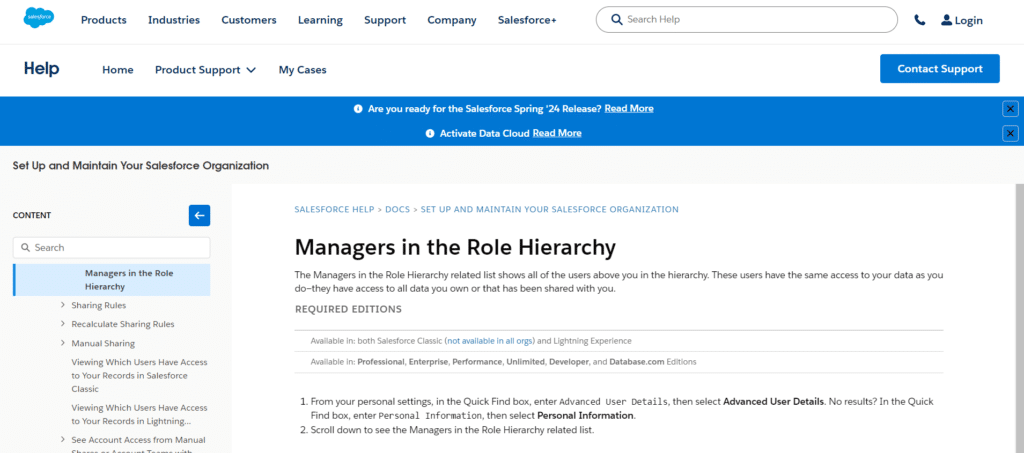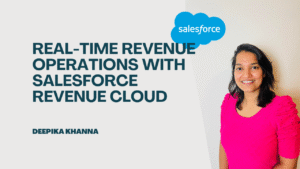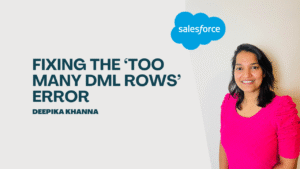Salesforce Program Manager: Effective management is essential to achieving organizational objectives and driving success in the fast-paced world of sales. We will examine a sales manager’s responsibilities in using Salesforce, a top customer relationship management (CRM) software, to its fullest in this blog post. Salesforce has completely transformed the way companies handle their sales processes, and a knowledgeable manager may make use of its capabilities to increase productivity, optimize sales, and streamline operations.

Table of Contents
ToggleProgram Management: Definition
Organizations typically determine the best course of action for accomplishing their objectives, targets, transformation plans, service additions and updates, retiring strategy for their legacy systems, cloud adoption plan, etc., based on input from their customer base and the various business units involved in the decision-making process.
An organization’s more extensive project that is divided up across several departments is called a “Programme,” and the final result that the organization hopes to accomplish through this effort (program) is known as a Programme Goal.
What Role Does a Project Manager in Salesforce?
To begin, let us define “entry-level,” “mid-level,” and “senior” project managers. Experience years are not the ultimate determinant. The advancement of a project manager’s career depends more on experience, the number of ongoing projects, and project size (which indicates complexity) than it does on the length of service. Consider the years as a recommendation in the list below:

Project manager at the entry level: 0–2 years of experience (may go up to 5):
- Oversee projects with a $10,000 budget or less.
- It would help if you were prepared to manage up to seven or ten little projects at once.
- For pure PM activities, each project takes about 4-6 hours each week.
Mid-level: 5–7 years of experience, with a potential 10-year tenure:
Depending on your company, a “Mid-level” project can mean quite different things, but generally speaking, these are the signs:
- Oversee projects with a $50,000–$100,000 budget or expense.
- Can anticipate managing four to six projects at once.
- Depending on the volume of work you have on and the size of the project roster, each project may require 10–20 hours per week.
Project manager with over ten years of experience:
- Oversee projects with a budget or cost of £1,000,000 or more.
- Can anticipate working on one or two projects at once.
- Approximately 20–40 hours (full-time), depending on the project’s scope.
The duties of a project manager will change based on the scope of the implementation and their level of technical expertise. Within the Salesforce community, one can assume multiple roles based on their level of familiarity with the platform.
Where Do Salesforce Project Managers Work?
Regardless of the project’s size, having a capable project manager is essential to a successful Salesforce deployment.

Salesforce Project Managers collaborate closely with various client organization stakeholders to ensure that the implementation team—which includes developers, consultants, subject matter experts, and management—is organized appropriately.
There are two types of Salesforce Project Manager positions: “in-house,” which means you work for the company directly, or “consultant-side.”
Project managers are another resource that most Salesforce consulting partners have on their teams to oversee each project. This raises the implementation cost and is typically included as a percentage of the work statement in addition to the cost of implementing the technical requirements.
The responsibilities and responsibilities of a programme manager
Let’s examine each of the many duties performed by a programme manager in detail. I’ve divided these into the following categories according to the program’s advancement and milestones.
Program Initiation
- Program aim: To create a clearly defined program goal, the program manager collaborates with sponsors, points of contact, and other departments.
- Sponsorship of the program: The program manager is in charge of communicating with the IT/business sponsor, who will foot the bill for managing this endeavor. Large organizations’ programs may last up to a year or longer. During this period, a program manager is in charge of making sure the program’s resources—including money and budgeting—are allocated appropriately and used effectively.
- Program success criteria: Given the possibility of multiple stakeholders in the program scenario, the program manager must make sure they are in alignment with the heads of business units, decision-making bodies, and points of contact from various teams and user groups to ascertain the program’s success criteria according to their perspectives and the roles they play in the organization.
Plans for Programmes
Project managers (of various teams) within the program must specify the scope and timescales for their respective functions/areas after the program goal has been established. Based on the schedules and scope of each of these teams, the program manager must develop an overall program scope and timeline/delivery plan.
Alignment and strategy for the program: The program manager collaborates with the project managers of different teams to determine the best delivery strategy after the program’s scope has been established.
The majority of businesses currently use agile methods, but in my experience, there is another approach that is gaining popularity: hybrid methods combine waterfall and agile delivery methods.
For instance, I implemented an agile approach for the development, CIT (Continuous Integration Testing), SIT, and UAT phases and a waterfall approach for the requirement gathering and discovery stages.
Program Execution
The program manager is responsible for ensuring that the various program teams adhere to the delivery strategy and reach a consensus.
- Team readiness, and resourcing:The program team may comprise many development teams, testing teams, business users or user groups, and multiple stakeholders, in addition to team preparedness and resources. Understanding team readiness is a challenging task for a program manager, and in order to do so, they must regularly communicate with project managers and product managers (if we are discussing Agile delivery) to coordinate efforts and gain a thorough understanding of the various teams involved.
Any excessive or insufficient usage of the resources could result in serious harm.
- Controlling dependencies, risk, and mitigation strategy: Complicated corporate transformation initiatives contain a multitude of interconnected requirements, dependencies, and hazards. It is your duty as a program manager to make sure that the risks at the program level are identified, brought to light, shared with the stakeholders, and addressed upfront.
A mitigation plan must be in place to guarantee that the overall objective of the program is not compromised.
The role of the program manager is to collaborate with various program teams, including project managers, stakeholders, and business units, in order to identify and promptly resolve any conflicting requirements, dependencies, or risks early in the program.
- Reporting to stakeholders: When it comes to administering these precious and complex customer programs, communication is essential. Regular updates on all significant program milestones and overall program progress must be sent to stakeholders, program sponsors, and signing authorities.
Weekly steering committee meetings are typically held to evaluate the state of the RAG, progress, risks, mitigations, etc. All of these tactics need to be planned and aligned with the stakeholders by the program manager.
What distinguishes Salesforce Programme Management?
Every program has a unique flavour, level of complexity, and vibrantly interactive systems that come together to form the environment of that program.

Speaking of the on-premise systems and program execution, we can be specific (based on my personal experience, that there will be a lengthier relationship with several planned releases, upgrades, etc.
On the other hand, we also have some tiny and medium-sized programs for the cloud ecosystem that may be completed in a few months. As program managers, we must exercise extreme caution when laying out the scope for one of my customers because, in the process of aligning the releases, one feature may depend on another. The program manager must also make sure that all dependencies and alignment are known up front to the teams and that any conflicting requirements are flagged by the team’s project/product managers.
Skills required to work as a Salesforce Programme Manager
Here are a few of my best suggestions for being a successful program manager:
- Straightforward Communication
- Mental clarity
- Proactive and open
- Serve as a reliable resource for your client.
- Recognize the existing problems.
- Focus on detail, transparency, and the capacity to work with a variety of teams, including internal IT stakeholders, business teams, vendors, and customer and service providers like Salesforce.
- Be technically proficient and well-versed in the program’s ecosystem.
How to become a Program Manager
It is crucial to start by grasping the fundamentals. It would not be easy to bring the entire team together unless you have a firm grasp on how various ecosystems, products, and platforms operate.
Numerous systems are involved in Salesforce or any program for that matter; these include data migration, data cleansing, CRM, integration, CPQ, billing, testing teams, vendor teams, service providers, etc. Therefore, you must be able to comprehend the problems technically in order to collaborate with these teams and assist them in resolving the obstacles.
In conclusion
Salesforce project managers are unquestionably worthy of their pay because they manage Salesforce implementation projects from start to finish across a range of Salesforce “clouds” and complexity levels. Making sure the project is completed on schedule and within budget is their top responsibility.
A job in the Salesforce ecosystem is immensely fascinating and diversified. Regardless of the project’s size, having a capable project manager is essential to a successful Salesforce deployment.






